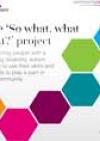conference report
Self-advocate allies join in solidarity
Community alliances, with people with learning disabilities in the vanguard, are the way to achieve understanding and empowerment. Rose Trustam sees self-advocacy take centre stage at Learning Disability England’s conference
It was a tribute to Learning Disability England (LDE) that most of the delegates and presenters at its conference were people with a learning disability and/autism, showing how it has reached out and belongs to them. Families were there too.
Providers supported the event through sponsorship and corporate membership but have truly moved back, giving the space for this national self-advocacy and campaigning group to grow in confidence.
This confidence was evident in the three women co-chairing the event – Jenny Carter, Vicky Buckingham and Lynn Jackson, as LDE chief executive Sam Clark took a back seat.
This is not to say that men were not in evidence. Among others, Gary Bourlet made a plea to organisations to support the self-advocacy movement, saying it was not necessarily about money but the need to step aside and give power to people.
The day’s message was that it is hard on your own so people need to come together.
Shaun Webster of Change launched the transgender work toolkit booklet (free to download from www.cmg.org.uk and www.changepeople.org). He was with Michael George, whose short reflection on human rights can be found on the Rightfullives website at www.rightfullives.net/Community-of-Perspectives.html.
In the Louder Voice project, LDE and providers Dimensions and Choice Support worked together to showcase Dimensions’ #ImWithSam campaign against hate crime against people with autism and learning disabilities (http://tinyurl.com/yypqqzxy).
Campaign adviser Mark Brookes and family consultant Liz Wilson from Dimensions spoke about this campaign and raising hate crime issues with the government.
The Louder Voices group was formed from a group of self-advocates, families and support staff on a six-day course provided by Dimensions.
Alongside learning about politics, rights, radio broadcasting and social media, group members got to know each other, which helped them appreciate each other’s various qualities and contributions (Anyone interested in Dimensions training should contact Alicia.wood@dimensions-uk.org.).
They talked about how they celebrated their voice and achievements with pride, aiming to get a louder voice across the country to link people up.
Tips included ‘learn by listening’ and ‘find one thing you’d change’ and putting people with lived experience up front. Support workers need to shift from assisting people to lead an ordinary life to helping them know their rights and getting out there to make things happen.
From the NHS, learning disability and autism network manager Katie Matthews and national learning disability director Ray James spoke of the health service’s 10-year plan priorities, promising follow-up work on Transforming Care, to work with Care Quality Commission on reducing restraint, seclusion and long-term segregation, the NHS commitment to homes not hospitals, and the seven day a week crisis service to reduce admissions. However, funding for all this was not mentioned.
Clark highlighted the importance of people with learning disabilities being heard and understood, and that genuine co-production and collaboration in service design can make a significant difference. LDE members want to ‘live our values and model the changes we want’, she said. Membership, which costs £12 a year, means being part of a movement that stands in solidarity as allies influencing, solving problems together and building networks to learn together.
Angela Catley from Community Catalysts and Nick Bishop, an expert by experience, talked about the So What, What Next? project. Funded by the Local Government Association (http://tinyurl.com/yb6o6fzr) this supports people with a learning disability or autism who have recently been discharged from hospital. They explored how people’s skills and passions can be used to find ways to contribute to their local communities.
Strength in everyone
Key lessons drawn from the conference were that everyone has strengths, a lot happens in the community and families and friends are very important.
Bad experiences of health and care services, including being called back repeatedly into hospital, create deep fears and make it hard for people to think of what might be possible. Good practice means starting early and the right support is vital, including a better balance between risks and opportunities as well as making longer-term plans, helping people to dream and making their ideas happen.
“Being moved four times made it hard to form trusting relationships. Each move meant starting all over again”
Bishop told of spending 16 years in hospital and being moved four times with only a few days’ notice, which made it hard to form trusting relationships. Each move meant starting all over again, feeling nervous and not knowing what to expect.
 Nick Bishop, who spent 16 years in institutional care, talked about So What, What Next?, a project to support people leaving hospital
Nick Bishop, who spent 16 years in institutional care, talked about So What, What Next?, a project to support people leaving hospital
For his latest move, people worked with him in hospital over time and he then visited the house. He felt insecure and scared without the hospital rules but he told staff how he felt and agreed rules to help his transition. Institutionalisation doesn’t go away overnight.
If you don’t subscribe but would like to support us, every small donation helps us continue our work. No donation too small. You can make this for no charge at Paypal Giving using a debit or credit card. DONATION
If you shop on line, why not join our supporters at easy fundraising. Costs you nothing but every purchase makes a small charitable donation to us. https://www.easyfundraising.org.uk/causes/clinitiatives/
